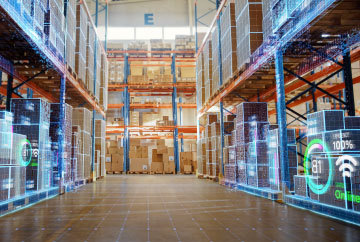The next phase of evolution in the supply chain is still at a premature stage, partly due to the shaken economy worldwide as the pandemic still poses a threat in many parts of the world. However, as organizations transition and put more emphasis on continuous improvement, solutions like process automation, business intelligence, and machine learning enable hybrid forms of cooperation.
Top Technology Trends that are Redefining the Supply Chain Ecosystem
In light of staying afloat to new market dynamics to maintain consumer service levels intact, it is important to indulge in plans that incorporate active inputs in the planning process. Machine learning using historic data provides the needed oversight, excluding human errors and emotions. In addition, technology is set to bring down supply chain overhead costs by optimizing the value chain across all control surfaces.
The Internet of Things and Machine Learning
The Internet of Things allows devices to collect and exchange data without human intervention. One of the most exciting areas in computing today is Machine Learning; it allows systems to learn from experience without being explicitly programmed.
When combined with other new technologies like artificial intelligence (AI), augmented reality (AR), virtual reality (VR), and Internet-of-Things (IoT), these developments could potentially help companies reduce their carbon footprint while also increasing productivity and lowering costs at every level along the supply chain process from raw materials through delivery.
Both IoT and machine learning are poised to have a major impact on how organizations conduct business in the future. For example, imagine if every piece of equipment in your warehouse is constantly monitoring itself for potential problems and sending alerts when something goes wrong? Or if all of your products were pre-labelled with information about where they came from, who made them when they were produced—even what temperature they were stored at? With machine learning technology, these scenarios have become possible today.
Research by Gartner showed that 59% of business owners have partially or fully infused IoT based solutions, while more than 12% are planning to implement and set things in motion within two years.
The supply chain has adapted by using alternative transportation modes such as air freighting, rail freighting, trucking, and sea freighting. The supply chain ecosystem has also found ways to cope with the lack of availability of some products and services by finding alternate sources or suppliers.
Blockchain
Blockchain provides a secure way for companies to track their inventory across multiple locations without having to share sensitive information. This allows each business partner in a supply chain network to have complete visibility into what is happening at any given time without compromising security concerns or privacy issues. As a result, it can provide transparency and security in supply chains and other business areas.
The global blockchain supply chain market is estimated to reach $ 9,852.91 million by 2025, growing at a CAGR of 80.2% from 2018 to 2025. The market is divided into smart contracts, payment & settlement, product traceability, inventory monitoring, compliance management, and others based on application.

Cloud computing
Cloud computing allows companies to store data in the cloud instead of on-site servers or local drives, allowing them to access their data anywhere at any time without worrying about latency issues experienced when trying to access data from remote locations such as headquarters or other locations.
Progressive companies have learned to respond quickly and efficiently to supply chain challenges by implementing real-time knowledge management systems. Cloud-based, mobile-enabled solutions allow supervisors at the worksite to notify operators of supply chain difficulties immediately so that workers can address the challenges at hand. With a transparent understanding of each other's operations, companies can build open and collaborative relationships with their vendors and contractors. In addition, these cloud-based solutions can automate the information exchange between organizations and suppliers.
RPA for supply chain
Many industries use RPA, including finance, healthcare, and insurance. It has also found its way into the supply chain industry, with many companies using it to streamline their processes and lower their costs. Using RPA, companies can reduce costs, improve productivity and increase customer satisfaction.
One way to use RPA in supply chain management is to manage its inventory levels by automatically tracking when products are available and how much inventory is left. This automation can help ensure that customers never run out of goods and that the correct level of the product is always available on shelves.
The most common use case for RPA in supply chains is automating tasks such as configuring orders or determining shipping costs. Unfortunately, these activities require workers to perform the same task over and over again. RPA can replace these repetitive tasks with automation to speed up the process while reducing mistakes
Tractica Research estimates that the worldwide sales of warehousing and logistics robots will reach $22.40 billion by the end of 2022.
RPA can automate processes such as:
- Data entry
- Inventory management
- Order fulfilment
- Improve the employee safety index
- Increases organizational efficiency by enabling businesses to respond quickly to changes in demand.
Artificial intelligence
Companies use AI to make their processes more efficient and gain a competitive edge over their competitors.
Here are some examples on how AI is shaping the supply chain industry:
Companies can use AI to analyze data related to inventory management, which will help them make more informed decisions about how much inventory they should carry at any given time.
AI can also be used to identify patterns in purchasing behavior, which can help companies predict demand for specific products or services. This data can then be used to reallocate resources to be available when needed most.
Companies are increasingly using AI to optimize their supply chains by predicting where customers will want them to be based on past trends, weather conditions, and other factors impacting transportation costs and delivery times.
The benefits of this new technology are numerous and include:
- Improved forecasting and demand planning
- Reduced waste and overproduction
- Increased efficiency of operations
- An enhanced collaboration between employees, vendors, and clients
- Reduced risk of human error
Supply chain management is a complex process that requires a strong understanding of logistics, manufacturing, and more. Using technology to supplement the market with data-driven insights allows companies to make better decisions and improve their bottom line.
Recommended
Infor | 12 Min Read


